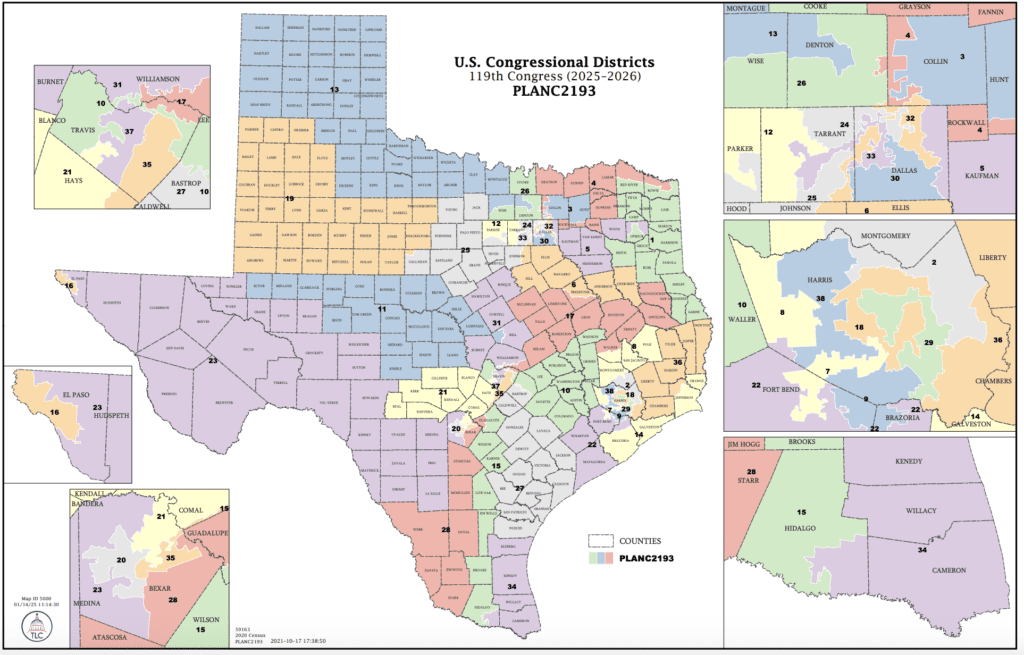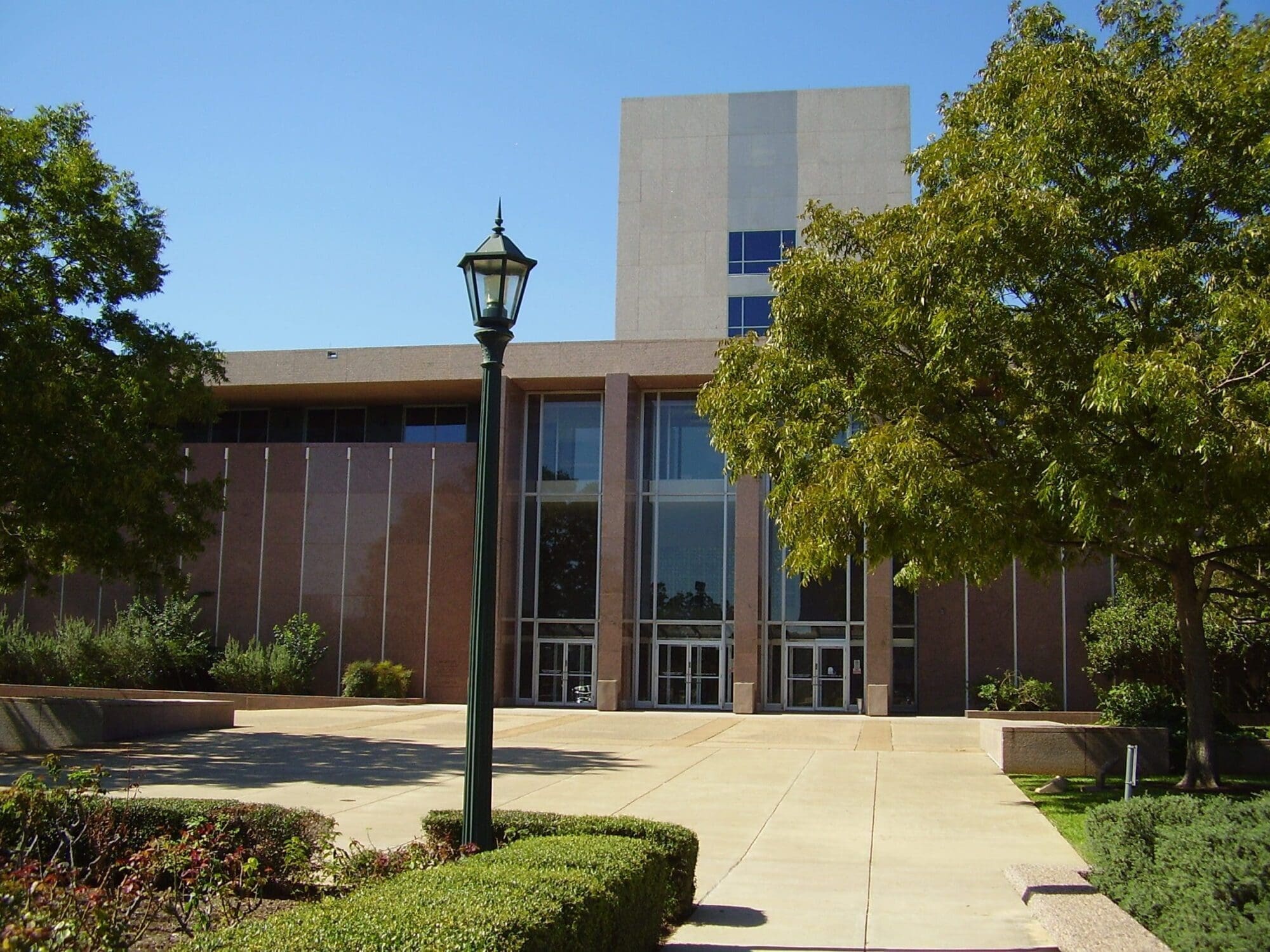Lawmakers in the Texas House and Senate are preparing to redraw the state’s congressional district boundaries during a special legislative session that started Monday, despite Democrats accusing Republicans of trying to “rig” the maps with the mid-census redistricting.
Redistricting is required every 10 years to reflect population changes recorded by the decennial census, but it may also be done at other times.
Gov. Greg Abbott added congressional redistricting to the special session agenda after receiving a letter from the U.S. Department of Justice Civil Rights Division urging Texas to rectify outdated “race-based” considerations used to create certain racially gerrymandered districts or face legal action.
Current congressional districts, drawn after the 2020 census, include several that were racially gerrymandered in accordance with provisions of the Voting Rights Act as “majority-minority” districts, which allow certain protected classes of voters an opportunity to elect candidates they prefer.
The DOJ identified four districts—three in the Houston area and one in Dallas-Fort Worth—as majority-minority “coalition districts” that are based on combinations of different racial groups whose main commonality is that they vote for Democrats.
A 2024 federal court ruling in a redistricting case known as Petteway v. Galveston County established that districts based on “coalitions” of minority groups are not protected by the Voting Rights Act.
“Although the State’s interest when configuring these districts was to comply with the Fifth Circuit precedent prior to the 2024 Petteway decision, that interest no longer exists,” wrote Assistant Attorney General Harmeet Dhillon.
A U.S. Supreme Court decision in 2019 had already cleared the way for redistricting based on party affiliation.
Those rulings opened the door for Texas to revisit its electoral district maps ahead of the 2026 mid-terms, and for Republicans to solidify support for President Donald Trump’s America First agenda.
Trump has mentioned flipping as many as five Texas seats from Democrat to Republican, although three may be a more realistic number.
Republicans’ overall advantage in the U.S. House is 219-212, with four vacant seats.
Texas Republicans currently hold 25 of the state’s 38 congressional House seats, while Democrats hold 12 seats. One traditionally Democrat seat, TX-18, is vacant and targeted for redistricting. The DOJ also identified TX-09 and TX-29 in the Houston area, and TX-33 in Dallas-Fort Worth, as constitutionally suspect coalition districts.
Starting in late 2024, Republican Party leaders at the federal and state levels began encouraging lawmakers to consider redrawing Texas’ congressional maps in the wake of the Galveston County win, which upheld partisan-drawn districts and rejected coalition districts.
“We now have a right—in fact, we have a duty—to redistrict the seats,” said Republican National Committeeman Dr. Robin Armstrong, who is also a Galveston County commissioner, during a December podcast with RNC Committeewoman Debbie Georgatos.
After state lawmakers chose not to take up the issue during their regular legislative session, Texas Republicans urged Abbott to add redistricting to a special session agenda.
With the special session now underway, both chambers have appointed special committees on congressional redistricting, and the House has already scheduled committee hearings to begin Thursday.
House Speaker Dustin Burrows kept most of the same members from the regular-session Redistricting Committee on the 21-member Select Committee on Congressional Redistricting, including State Rep. Cody Vasut (R–Angleton) as chair and State Rep. Jon Rosenthal (D–Houston) as vice chair.
Missing from the newly appointed committee are State Reps. Tom Oliverson (R–Cypress), the House GOP Caucus Chair, and Jolanda Jones (D–Houston). Jones is running in the special election for the targeted TX-18.
House Redistricting hearings will be held on Thursday, July 24, in Austin; Saturday, July 26, at 11:00 a.m. at the University of Houston; and Monday, July 28, at 5:00 p.m. at The University of Texas Arlington campus.
In the Senate, Lt. Gov. Dan Patrick appointed six Republicans and three Democrats to the Special Committee on Congressional Redistricting, with State Sen. Phil King (R–Weatherford) as chair and State Sen. Brandon Creighton (R–Conroe) as vice chair.
Democrats are characterizing Republicans’ redistricting plan as a partisan power grab—even as Democrats in other states are also proposing mid-census redistricting to improve their party’s congressional representation.
At a press conference on Monday, the Texas House Democrat Caucus said “all options” are on the table to thwart the plan—including breaking the two-thirds quorum (100 of the 150 House members) required for the Legislature to conduct business. Democrats hold 62 House seats.
The Democrats also launched a website last week outlining their intent to “use every tool available—including breaking quorum if necessary.”
House Democrats fled the state to break quorum in 2003 and again in 2021. Both efforts failed to stop the legislation Democrats opposed—redistricting and election reform.
Both efforts also failed to result in any consequences for the quorum-busters.
Despite partisan protestations, even left-leaning Texas Monthly acknowledges Democrats can’t stop Republicans’ redistricting plans.
“There’s no scenario in which Texas Democrats can stay out of the state for long enough to prevent Republicans from implementing their map beginning with the March primary, whose date they can move back if necessary. The quorum break is by definition the act of a powerless minority—an attempt to make the public care.”






